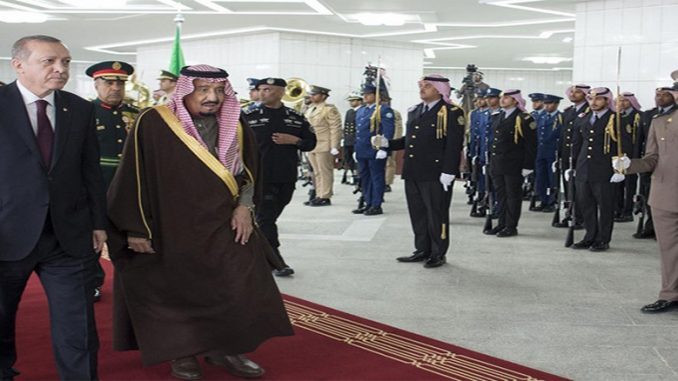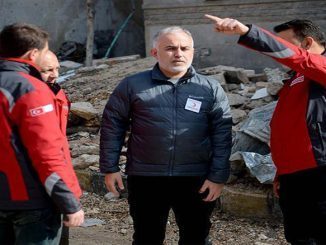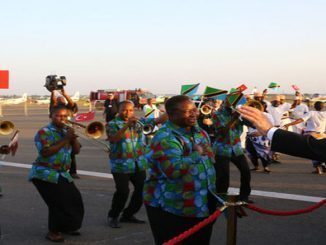
 BY: Yasin Aktay*
BY: Yasin Aktay*
When the regional countries remain inactive in producing solutions to the issues of the region, many others try to have a say. And those who step in from the outside will only mess things up further. The traffic in the region is rather intense, therefore there are unlimited benefits. Most of the problems that have emerged up to this point are due to poor relations. One style of international politics might find that the way to be in peace is to remain disconnected from one another. The mentality that the fewer the relations the less the problems has been an ideal practice of “peace in the world” principle in the past. But our world forces people, countries and nations to establish relations with each other. Therefore, both international politics and diplomacy will find its ideal implementation through easing relations and paving the way for them.
The Gulf countries are doing a good job of forming unity among themselves and reinforcing it. But it isn’t possible to say that this unity has been successful in understanding the threats it faces or in developing policies to overcome them. If this unity had produced proper policies, the Syrian crisis would not have deepened nor continued to today. Supporting the coup in Egypt was probably due to the Muslim Brotherhood, which came about democratically and which has no armed violent tendencies being considered as a threat. But the vacuum created by disabling the Brotherhood and which continues to form, is being filled by armed violent movements, the expansionist politics of Persian nationalism and regional instabilities that are threatening the Gulf countries more ominously.
A genuine search for a policy is needed (as well as wide participation) to escape these dead-ends. Thus, dialogue, diplomacy, bilateral visits and mutual cooperation should be developed. Although Turkey is separated with the Gulf countries on the Egypt and Syria issues, Turkey has not broken off from them. Turkey still insists that they are sharing a common fate. Everything that threatens the Gulf threatens Turkey. Every development that threatens Turkey threatens the Gulf countries. We see that the Gulf countries, too, accept this fact.
An agreement to lift visas reciprocally with Bahrain was signed during the president’s visit. The same agreement was signed with Qatar and Kuwait earlier, too. This contributes greatly to the trade between the gulf countries and Turkey. During his presense at the opening ceremony of the Yavuz Sultan Selim Bridge to show his solidarity with Turkey after the July 15 coup attempt, the emir of Bahrain stated that he wanted Turkish contractors to build a bridge between Bahrain and Saudi Arabia.
Before the Saudi visit, there was a High Coordination Council meeting in Ankara which Saudi Arabia also attended. Setting this date in April of 2016 during the king’s Turkey visit, the meeting took place on Feb. 8 with the participation of the foreign ministers of both countries. It was evident that the preliminary preparations were complete before the Saudi Arabia visit, thus this had an effect on all levels of the developing relations. King Salman bin Abdulaziz personally coming to the airport to welcome President Erdoğan was a clear sign of his respect toward him. This value was evident in all levels of the visit and of course the outcomes.
We can say that nearly all the people of the Gulf countries have a high demand and request that the relations with Saudi Arabia are kept at high levels. Even if we cannot see the relations at this level between the states, the integration between the nations is almost complete. Many Kuwaitis and Qataris own properties in Turkey which they visit every year. There are direct flights from 7-to-8 Saudi cities to the Black Sea province of Trabzon every day, as many Saudis see Trabzon as their second home. I attended an event held by Riyadhi businessmen. We attended the event with Justice and Development Party (AK Party) Secretary General President Abdülhamit Gül, Deputy Chairman Vedat Demiröz and Group Deputy Chairman Mehmet Muş. Although the event was announced to take place only a few hours before everyone was present there, there were more than 50 businessmen from Riyadh. They all owned real estate in Turkey and had textile factories or factories in other sectors. They were all in love with Erdoğan – we felt this in every step they took. They explained how they felt July 15 was an attempt toward them. They also explained how they all accepted Erdoğan’s suggestion to exchange their dollars (and they did), as they believed that the movement in the exchange rate of the dollar was a another kind of coup.
The details of the meetings were published in the el-hayat newspaper a day later. We listened to their requests and problems. Since Saudi Arabia is not allowed dual citizenship, they request that a long-term visa or residency be granted to them. They also requested that the limit on the Turkuaz card used for investment, property buying and citizenship be reduced from $1 million to $300,000. They also pledged that they would increase Saudi investment in Turkey. We took notes, shared them and took the first steps toward a solution. There was more I would have liked to discuss, but Im afraid.
*Yasin Aktay is the vice chair of the ruling Justice and Development (AK Party) in Turkey.
(Published in Yeni Şafak Turkısh newspaper on Saturday, Feb. 18, 2017)



